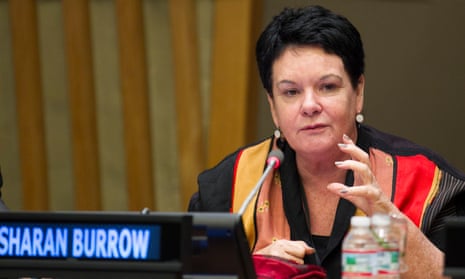The world’s top union official has said it is “appalling” that an Australian employer group has opposed a binding global convention against gender-based violence and harassment at work.
Sharan Burrow, the International Trade Union Confederation general secretary, criticised the Australian Chamber of Commerce and Industry, which in turn claims its position has been misinterpreted by the International Labour Organization.
The ILO wants to stamp out violence and harassment against women and men in work, by developing an instrument which could mandate or encourage national laws such as paid domestic violence leave.
According to a position paper it released on Wednesday, such a move is backed by 177 national union groups, 79 governments and 13 employer groups worldwide.
The Australian government agreed to such an instrument but backed a non-binding recommendation rather than a binding convention. According to the ILO the Australian Chamber of Commerce and Industry – with employer groups in New Zealand, Korea, Japan and Austria – have expressed a preference for no instrument, but if the ILO pushes ahead, for the instrument to be non-binding.
In comments that suggest the ILO misrepresented its position, the chamber of commerce chief executive James Pearson told Guardian Australia “we have not said that there should not be an instrument”.
“We need to engage with employer and employee representatives, and governments, at the International Labour Conference to determine the best approach,” he said.
Burrow, the former Australian Council of Trade Unions president, told Guardian Australia more than 800 million women experience gendered violence, many of them in the workplace.
“Making basic global rules about gendered violence is an important step to making a safer, freer world for working women,” she said.
It was “appalling” that employers would oppose measures to eliminate violence and harassment, which harm workplace productivity.
“Violence at work is incredibly prevalent – employers do have a responsibility for safe workplaces,” she said.
“Beyond that they can also help ensure safe haven is possible ... by providing domestic violence leave - which is one of the central demands of the convention.”
Burrow said it was “terrific” that the #MeToo movement had provided a “framework of security for women to speak out” because “silence [about abuse] can never be a condition of employment”.
“Unfortunately there has been a worldwide wave of misogyny that has legitimated harassment violence from both authoritarian leaders in democracy and dictatorships.”
A convention would provide an international baseline that would help build a rights-based framework into labour laws to stop abuses that are “not legislated [against] and prosecuted in many countries”.
Burrow said Australia had “a good story to tell” because four states had legislated for 10 days’ domestic violence leave in the public sector and many employers included it as a right in workplace deals.
The Turnbull government opposes paid domestic violence leave, but both Labor and the Greens have promised to legislate to create the workplace right after the Fair Work Commission rejected a union push to include it in modern awards.
Pearson said “employers value their employees and want to provide working environments that are free from violence, discrimination and harassment”.
He said the chamber of commerce would “play a lead role in the global discussion” but the form of the instrument would be up for debate.
In comments on the ILO proposal, the chamber of commerce and industry said employers’ responsibilities “must be reasonable and in respect of things over which employers have actual control”.
“Domestic violence is a community problem that can have spillover effects into the workplace and needs to be addressed, but care also needs to be taken to ensure that the responsibility of the state is not placed on the shoulders of employers,” it said.
It warned that rules requiring assessment of risks could prove “very onerous for smaller enterprises and informal businesses”.

Comments (…)
Sign in or create your Guardian account to join the discussion